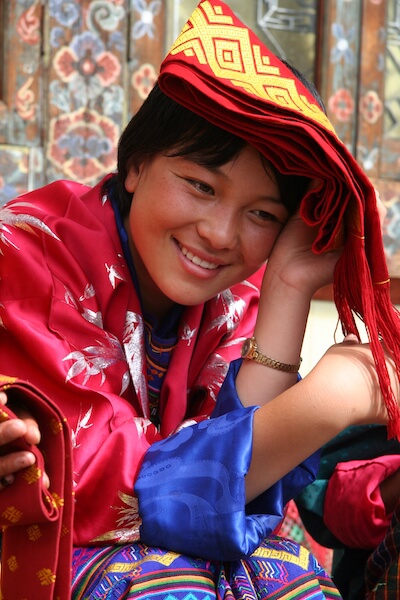 Gross National Happiness or GNH is a holistic and sustainable approach to development that balances material and non-material values with the conviction that humans want to search for happiness. The objective of GNH is to achieve a balanced development in all the facets of life that are essential for one’s happiness.
Gross National Happiness or GNH is a holistic and sustainable approach to development that balances material and non-material values with the conviction that humans want to search for happiness. The objective of GNH is to achieve a balanced development in all the facets of life that are essential for one’s happiness.
The concept of Gross National Happiness (GNH) was promulgated by His Majesty Jigme Singye Wangchuck, the Fourth King of Bhutan in the early 1970s. Importantly, Bhutan’s ancient legal code of 1629 also stated that ‘if the government cannot create happiness for its people, then there is no purpose for Government to exist’. The code stressed that Bhutanese laws must promote happiness for all sentient beings – as a Buddhist nation so it is clear that the cultivation of compassion emerges from this ancient wisdom. The focus was not just the economic progress of Bhutan but of a flourishing human society living in harmony with nature. Today, there is plenty of research showing that wealth alone does not contribute to life satisfaction or happiness. GNH measures the quality of its development in a more holistic way and believes that the beneficial development of human society takes place when material and spiritual development occurs side by side.
Bhutan embraced democracy in 2008, wherein the Constitution of Bhutan, Article 9 further ensured the inclusion and continuity of GNH values by defining duties such as: ‘The State shall strive to promote those conditions that will enable the pursuit of Gross National Happiness.’ Thus, Bhutan ensures enabling conditions for happiness to be the sole purpose of its development. Over the years GNH has evolved from a noble aspiration into a more quantifiable tool. Today, GNH is technically defined as a ‘multi-dimensional development approach seeking to achieve a harmonious balance between material well-being and the spiritual, emotional and cultural needs of society’.
Four pillars of Gross National Happiness:
Good Governance
Good Governance is considered a pillar for happiness because it determines the conditions in which Bhutanese thrive. While policies and programs that are developed in Bhutan are generally in line with the values of GNH, there is also a number of tools and processes involved to ensure the values are indeed embedded in social policy.
Sustainable Socio-economic Development
A thriving GNH economy must value the social and economic contributions of households and families, free time and leisure were given the roles of these factors in Happiness.
Preservation & Promotion of Culture
Happiness is believed to be contributed by preserving the Bhutanese culture. Developing cultural resilience can be understood as the culture’s capacity to maintain and develop cultural identity, knowledge and practices and able to overcome challenges and difficulties from other norms and ideals.
Environmental Conservation
Environmental Conservation is considered a key contribution to GNH because, in addition to providing critical services such as water and energy, the environment is believed to contribute to aesthetic and other stimuli that can be directly healing to people who enjoy vivid colours and light, untainted breeze and silence in nature’s sound.
 The four pillars are further elaborated into nine domains, which articulate the different elements of GNH in detail and form the basis of GNH measurement, indices and screening tools.
The four pillars are further elaborated into nine domains, which articulate the different elements of GNH in detail and form the basis of GNH measurement, indices and screening tools.
1. Living standards
2. Education
3. Health
4. Environment
5. Community Vitality
6. Time-use
7. Psychological well-being
8. Good Governance
9. Cultural resilience and promotion
These 9 domains clearly demonstrate that from the perspective of GNH, many inter-related factors are important in creating the conditions for happiness.
The balance between material and non-material development and the multi-dimensional and interdependent nature of GNH are key features that distinguish GNH from GDP as a measure of a country’s progress. In accordance with these 9 domains, Bhutan has developed 38 sub-indexes, 72 indicators and 151 variables that are used to define and analyse the happiness of the Bhutanese people.